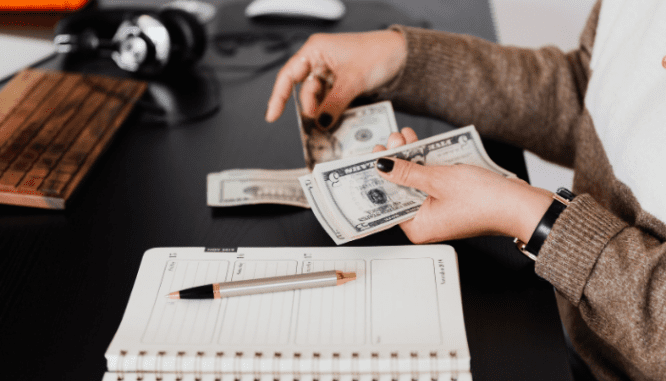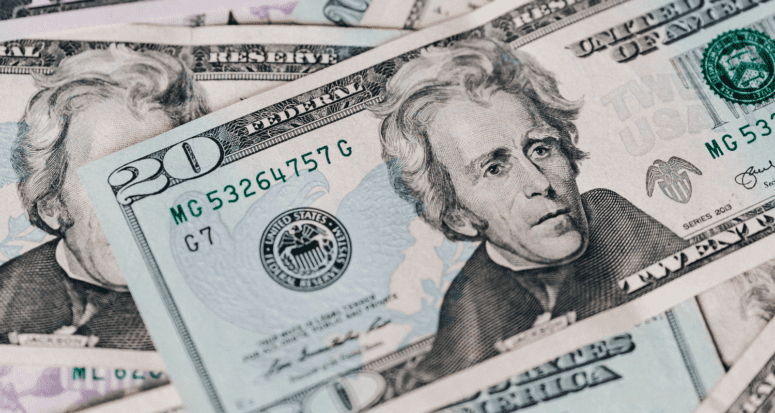5 Ways the Process for Buying a House with Cash Is Unlike a Mortgage
- Published on
- 5 min read
-
 Chelsea Levinson Contributing AuthorClose
Chelsea Levinson Contributing AuthorClose Chelsea Levinson Contributing Author
Chelsea Levinson Contributing AuthorChelsea Levinson, JD, is an award-winning content creator and multimedia storyteller with more than a decade of experience. She has created content for some of the world’s most recognizable brands and media companies, including Bank of America, Vox, Comcast, AOL, State Farm Insurance, PBS, Delta Air Lines, Huffington Post, H&R Block and more. She has expertise in mortgage, real estate, personal finance, law and policy.
You’re gearing up to buy a home and figuring out how you’re going to pay for the biggest asset you’ll own: all-cash or mortgage? Each option has pros and cons, no doubt. But what about the actual process for buying a house with cash versus using a mortgage? There are a few key differences to understand before jumping into your purchase.
We tapped the expertise of two of California’s top real estate agents who are well-versed in all-cash deals, thanks to the Golden State’s highly competitive housing markets. They walked us through how the process for buying a home in cash is different than using a mortgage. Here’s what buyers need to know.

You’ll have more leverage at the offer table
One big way all-cash differs from using a mortgage? The competitive advantage it gives you at the negotiating table. With cash, you’ll have more leverage with the seller, and you can potentially get a better deal if you’re flexible.
Sellers prefer cash offers because mortgages take a long time, and they can come with a dose of uncertainty. On average, a home loan takes around 47 days to close, while a cash purchase can close in as little as one week. Plus, there’s always the risk that a mortgage won’t close at all, whether because an appraisal comes in too low, or because the buyer’s financial situation changes and the loan can’t clear.
“In theory, you’re taking risk off the table for the seller, and you can be a lot more flexible and creative with terms and credits,” explains top San Diego real estate agent Daniel Beer. “There’s definitely more control for the buyer.”
What does more control for the buyer mean? It might mean saving money on the purchase price (some sellers will accept lower all-cash offers just for the certainty), the ability to set your own purchase timeline with the seller, or just an overall stronger and more attractive offer.
The bottom line: Cash offers are three times more likely to be accepted, which puts you in the upper echelon of buyers, and a lot more likely to win.
You can skip the appraisal
When you pay cash for a home, you can also skip the home appraisal process entirely.
But let’s back up a minute: What’s a home appraisal? The appraisal is when a neutral third party looks at the property and all its features, and studies comparable recent home sales in the area to determine the home’s market value.
When you use financing, getting an appraisal is a non-negotiable step in the process, and your home loan is contingent on the results of the appraisal. If the appraisal comes in too low — meaning the home is worth less than you offered on it — you may need to renegotiate, come up with the money to cover the difference, or walk away from the deal entirely.
Mortgage lenders require appraisals to protect their investment in the property and make sure the home is actually worth the money they’re putting up for it.
But some buyers — and sellers — see the appraisal as yet another obstacle to overcome before they can seal the deal. Cash buyers have the flexibility to skip this step.
“If you don’t want to perform the appraisal, you don’t have to ’cause you’re buying the property in cash,” explains top California real estate agent Ramon Sanchez.
Still, that doesn’t necessarily mean you should skip the appraisal.
“I always recommend making the investment to get an appraisal done,” Sanchez cautions. “Because you still want to know what you’re buying.”
The bottom line: Appraisals are optional if you pay in cash, but just because you can skip the appraisal (psst: and potentially pay over market value!), doesn’t mean you should.

You won’t pay any lender fees
“When you’re buying a property in cash, you don’t have lender fees,” shares Sanchez. “All the loan fees you normally have when you buy a house and you’re using financing, those get eliminated.”
This can save you substantially on closing costs if you’re paying in cash, as lender fees can tack on up to 3% of the loan amount.
You’ll still have to pay some closing costs, like settlement fees, prepaid taxes, recording fees, and so on, but you can skip loan-related expenses like loan origination fees, credit pulls, and application fees.
The bottom line: Lender fees can add up to thousands, and with all-cash, you can skip them.
Cash deals close quicker and with less paperwork
There’s no doubt about it: A cash deal is simpler and requires way less paperwork than getting a mortgage. With no mortgage to worry about, you’ll likely close much faster, and with far less confusion. Cash deals can close in as little as a week, while mortgages take an average of 47 days.
With a mortgage, your lender needs to thoroughly vet your finances and complete a lot of due diligence on the property to make sure the loan is safe — a process that can stretch for weeks, and sometimes months. You’ll be asked to sign tons of forms and submit paperwork on every aspect of your finances. Cash, on the other hand, is as easy as wiring the money.
“A day or so before the closing, or maybe the day of the closing — as long as it’s in the morning — the buyer wires in the cash,” Beer explains. “It’s the simplest process you can have. It’s cash! You just wire the money, and you close.”
The bottom line: You can expect to close the deal much faster with cash, and with much less paperwork.

Due diligence falls on the buyer
So you know how we mentioned that lenders do a lot of due diligence on a property before they’ll issue a mortgage on it? And the reason they do this is because they’re trying to protect their investment? When you buy a home in cash, you’re on your own.
Well, not entirely on your own. Hopefully, you’ve got a top real estate agent by your side who can guide you through the process and make sure you’re getting the best possible deal (if you don’t, we’d be happy to help match you with one!). But with all-cash, decisions about inspections and appraisals and how much you’re willing to pay for the home will ultimately fall on you, the buyer.
There’s no lender stepping in to make sure you’re not overpaying. It’s on you to make sure you’re catching everything and paying a fair price. And as attractive as it may be to the seller to skip the inspection and appraisal — as these steps present the most risk to the deal — it’s rarely beneficial to the buyer to skimp on their due diligence.
With a home being one of the biggest purchases you’ll make in your life, you’ll want to make sure you’re investing wisely, especially if you’re putting up a whole bunch of cash.
Bottom line: There’s no lender to protect your investment when you pay cash, so it’s up to you to perform all due diligence and make sure you’re paying a fair price.
The potential pitfalls of buying in cash
Buying in cash sounds pretty great on the surface, right? You might get a cash discount, you’re automatically moved to the top of the offer pile, you can skip all the frustration and paperwork of getting a mortgage, you’ll close way faster, and you don’t have to make mortgage payments once the transaction closes.
But there are also quite a few all-cash pitfalls to consider, too.
It takes a really long time to save cash
Saving to buy a home takes a long time, even if you’re using financing.
For median-income Americans, it takes an average of 14 years to save up 20% for a down payment. In the most expensive cities in the country, it takes much longer — up to 30 years or more. And that’s just for 20% down, not 100% of the cost of a home!
While you’re busy saving cash, homes are getting more expensive year after year, and you’re missing out on building equity in your new home.
Needless to say, you can probably get into your dream home faster if you use a mortgage. That’s kind of why they exist in the first place.
You might have a smaller home budget
Speaking of how long you’d have to save to buy a home in cash, it’s also worth noting that you’ll likely be able to afford a nicer home, faster, using a mortgage.
Living mortgage-free is great and all, but what if you can only afford a fixer-upper with your cash budget? Where will you get the money for repairs?
What if, instead, you used that chunk of change you’ve been saving, and made a sizable down payment on a home instead? If you put down 20% or more, you can even skip the mortgage insurance.
Tying up your cash in one asset may not be your best financial move
Putting your money in real estate tends to be a decent long-term investment. But is it wise to put all your money into one real estate purchase? Probably not.
“You look at the most sophisticated real estate people; they don’t buy cash,” explains Beer.
“That’s money that’s not invested properly in other areas, plus the appreciation you’re losing from the market, plus your mortgage write-off.”
When mortgage rates are low, you can often make your money work for you better without sinking all your cash into one investment. It’s probably a better strategy to broaden your investment portfolio.
Plus, when you put money into a home, it’s not exactly easy to access it again.
“To access your money, you have to then go and borrow against it,” says Beer. “You have to refinance or sell your home. So it’s making a lot of money very illiquid.”

Header Image Source: (Karolina Grabowska / Pexels)
